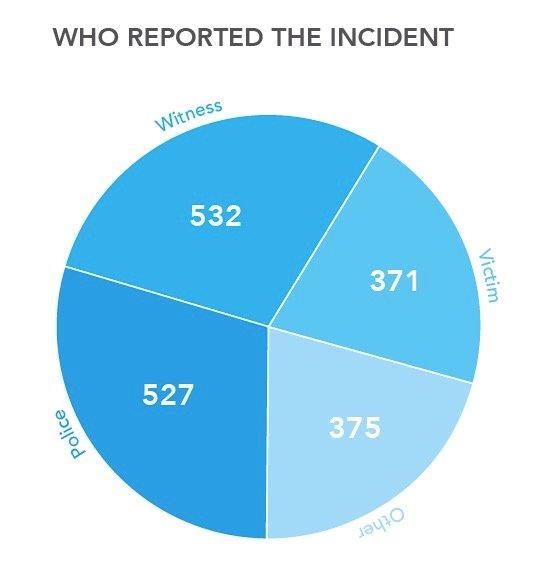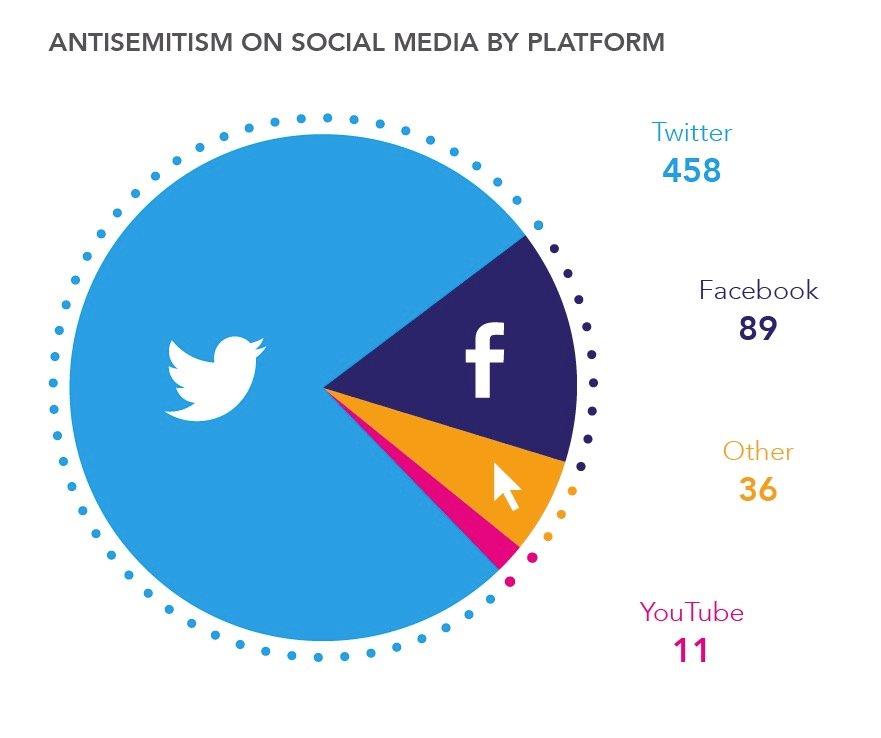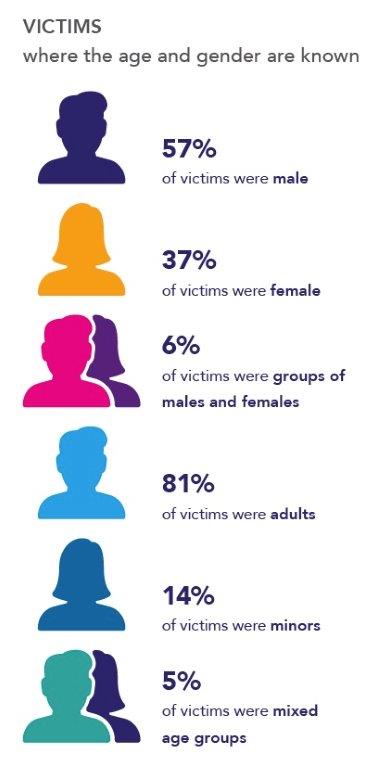Latest antisemitism stats reveal huge spike in online hate
1,805 incidents in 2019 represents the the fourth consecutive highest annual figure of hate, with online incidents almost tripling in just two years
Almost four in ten antisemitic incidents now recorded by the Community Security Trust in the UK are online, according to the monitor’s latest annual report.
Amid the record 1,805 incidents across 2019 – the fourth consecutive highest figure – the number of reported online incidents has almost tripled in just two years, which ministers called “appalling”.
Of the total, 697 incidents – or 39 percent – are now online. In 2018, by comparison, CST recorded 384 online incidents – or 23 percent of the total. In 2017 there were 249 online incidents – 18 percent of that year’s total.
National news appears to have triggered some antisemitic reaction, because the highest single monthly totals came in February and December, both months when the problem of antisemitism in the Labour Party was in the spotlight.
In February several Labour MPs, including Jewish politician Luciana Berger, resigned from the Party, many citing antisemitism, whereas in December the issue again came to the fore during the general election campaign.

Despite offline antisemitism decreasing in some areas, assaults against Jews returned to previous high levels in 2019, with 157 incidents reported. Last year, CST recorded 123 antisemitic assaults, with 149 reported in 2017.
Two incidents occurred on the same London bus route. In one, a man screamed “Jews don’t belong here” at a Jewish couple, before pulling the husband’s jacket hood and the wife’s sheitel.

In the other, a man reading a prayer book was subject to antisemitic verbal abuse from an adult male, who then directed his tirade at a group of girls. When the initial victim intervened, the perpetrator punched him in the arm.
Similarly, Jewish students were targeted more frequently in 2019 than in 2018, with 40 incidents compared to 25, of which roughly half were on-campus.
Communities Secretary Robert Jenrick MP said: “Our new funding to tackle antisemitism on campus and plans to combat online harms by targeting the appalling rise in antisemitic social media incidents form a vital part of our commitment to root it out of our society.”

Elsewhere in the report, there were improvements. Antisemitism targeting synagogues or congregants was down, as were comparisons between Israel and the Nazis, and the number of direct antisemitic threats. There was also a huge decrease in mass-produced or mass-emailed antisemitic literature, owing to investigations and arrests.

Despite the occasional bright spots, CST chiefs were still left facing the fourth consecutive year of record high levels of antisemitism in the UK, with chief executive David Delew calling it “another difficult year for British Jews”.
He said: “It is no surprise that recorded antisemitic incidents reached yet another high. It is clear that both social media and mainstream politics are places where antisemitism and racism need to be driven out, if things are to improve in the future.”
Board of Deputies president, Marie van der Zyl, said the stats are “profoundly depressing”, adding that there is “no doubt the ongoing antisemitism crisis in the Labour Party has had an effect on the figures and they will cause great anxiety to Jews in this country.”
“Overall it must be emphasised that Britain remains a happy place for its Jewish community. However, we call on the country’s political leaders – in all parties – to fight the evil of anti-Jewish racism and make this a just, safe and respectful society for everyone.”
Home Secretary Priti Patel MP said: “It’s appalling that we have seen another increase of sickening abuse against the Jewish community. We need to do much more to tackle antisemitism and the intolerance this creates across society.
“I am pushing for greater collaboration, both across government, policing, the courts and community groups, to remove this shameful stain on our society.”
Deputy Chief Constable Mark Hamilton, national policing lead for hate crime, said the report “shines a light on contemporary antisemitism which, like all hate crime, has been under-reported… Often we discover that increases are brought about by better services and increased victim confidence to report, but one offence is too many”.
Online Abuse
Online abuse includes social media posts, emails, comments on online articles, direct messages and website hacking, yet the extent to which it originates in the UK is unknown, because most perpetrators shield their identities and locations.
This means that the perpetrators – typically Twitter users – can post antisemitic material from anywhere in the world, but if it is reported to the CST by UK-based observers and targets someone in the UK then it is reported in the UK stats.
The location of those reporting online antisemitism can even affect a region’s total figures. For example, there were 21 antisemitic incidents across all categories in Merseyside in 2018. That jumped to 56 last year, of which 28 were reported online.
CST said it was “difficult to assess” whether the increase reflects a genuine rise in the amount of antisemitic expressions online, “or an increase in reporting, facilitated by the relative ease of tagging CST in a thread or post,” adding: “The truth is likely to lie somewhere in the middle.”
Karen Pollock, Chief Executive of the Holocaust Memorial Day Trust, said: “Yet again, we are seeing alarming increases in antisemitic incidents in the UK. In particular, the increase of 82% in incidents of online antisemitism, and the clear evidence in the report of antisemitism in our political sphere, shows that the world’s oldest hate always finds a way to mutate and spread, and we must redouble our efforts to fight it on all fronts.
This deeply concerning trend of increasing incidents only reinforces why we must continue our vital work in educating future generations about where hatred and antisemitism can ultimately lead.”


Thank you for helping to make Jewish News the leading source of news and opinion for the UK Jewish community. Today we're asking for your invaluable help to continue putting our community first in everything we do.
For as little as £5 a month you can help sustain the vital work we do in celebrating and standing up for Jewish life in Britain.
Jewish News holds our community together and keeps us connected. Like a synagogue, it’s where people turn to feel part of something bigger. It also proudly shows the rest of Britain the vibrancy and rich culture of modern Jewish life.
You can make a quick and easy one-off or monthly contribution of £5, £10, £20 or any other sum you’re comfortable with.
100% of your donation will help us continue celebrating our community, in all its dynamic diversity...
Engaging
Being a community platform means so much more than producing a newspaper and website. One of our proudest roles is media partnering with our invaluable charities to amplify the outstanding work they do to help us all.
Celebrating
There’s no shortage of oys in the world but Jewish News takes every opportunity to celebrate the joys too, through projects like Night of Heroes, 40 Under 40 and other compelling countdowns that make the community kvell with pride.
Pioneering
In the first collaboration between media outlets from different faiths, Jewish News worked with British Muslim TV and Church Times to produce a list of young activists leading the way on interfaith understanding.
Campaigning
Royal Mail issued a stamp honouring Holocaust hero Sir Nicholas Winton after a Jewish News campaign attracted more than 100,000 backers. Jewish Newsalso produces special editions of the paper highlighting pressing issues including mental health and Holocaust remembrance.
Easy access
In an age when news is readily accessible, Jewish News provides high-quality content free online and offline, removing any financial barriers to connecting people.
Voice of our community to wider society
The Jewish News team regularly appears on TV, radio and on the pages of the national press to comment on stories about the Jewish community. Easy access to the paper on the streets of London also means Jewish News provides an invaluable window into the community for the country at large.
We hope you agree all this is worth preserving.






















